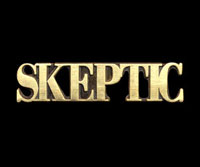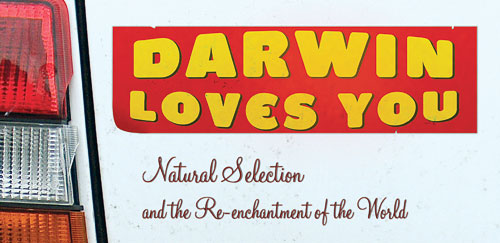
upcoming lecture…
Mistakes Were Made (But Not By Me):
Why We Justify Foolish Beliefs, Bad Decisions, and Hurtful Acts
with Dr. Carol Tavris
Sunday, April 29th, 2pm
Baxter Lecture Hall, Caltech
Why do people dodge responsibility when things fall apart? Why the parade of public figures unable to own up when they screw up? Why the endless marital quarrels over who is right? Why can we see hypocrisy in others but not in ourselves? Are we all liars? Or do we really believe the stories we tell? Renowned social psychologist Dr. Carol Tavris takes a compelling look into how the brain is wired for self-justification. When we make mistakes, we must calm the cognitive dissonance that jars our feelings of self-worth. And so we create fictions that absolve us of responsibility, restoring our belief that we are smart, moral, and right — a belief that often keeps us on a course that is dumb, immoral, and wrong.
Dr. Tavris is a social psychologist and author of Anger and The Mismeasure of Woman. She has written for the Los Angeles Times, the New York Times, Scientific American, and many other publications. This lecture is based on her book, co-authored with Dr. Elliot Aronson.
WEAR the new SKEPTIC lapel pin!

actual size is 1″ wide by 1/4″ high
Our new tie-tack style metal pin has gold-colored SKEPTIC lettering with a contrasting black background. It’s a great size for a lapel or tie — about 1 inch wide by 1/4 inch high. It comes in a classy little plastic box suitable for gift-giving. (Note: not shown actual size.) ORDER the pin >



Scott Sigler
This week on Skepticality, author and skeptic Scott Sigler talks to Derek & Swoopy about finding the skeptic movement, and the recent success of his newly released, science-informed horror novel Ancestor (an Amazon.com bestseller). Scott also tackles the future of traditional book publishing in the age of podiobooks. Before we let him go, Scott reveals the names of the folks who will be receiving autographed copies of his books Earthcore and Ancestor.
Long-time listeners, take note: also included this week is the return of Skepticality news.
In this week’s eSkeptic Dr. Norman Levitt reviews by George Levine’s book entitled Darwin Loves You: Natural Selection and the Re-enchantment of the World (Princeton University Press, 2006, ISBN 0691126631).
Dr. Norman Levitt is a professor of mathematics at Rutgers, New Brunswick, where his salary is a modest fraction of what the football coach is paid. He writes frequently for Skeptic and other publications on the relation of science to culture and politics. He is the author of Prometheus Bedeviled and Higher Superstition (the latter joint work with Paul R. Gross) and he is one of the editors of The Flight from Science and Reason. Recent publications include the entry on the Sokal Affair in the Encyclopedia of Science, Technology, and Ethics and a chapter on pseudoscience and pseudohistory in Archeological Fantasies (edited by Garrett Fagan).

Darwin Loves You (detail of cover)
Theodicy for Atheists
The Problem of Evil in a Darwinian World
book review by Dr. Norman Levitt
Conceivably, it would be good to have a new book proclaiming that There Is No God (period) and Darwin Is His Prophet, an epic justifying the ways of the Great Nonexistent to Man through a contemplation of evolutionary truth. George Levine, an eminent scholar of English literature whose specialty is the study of the effects of Darwin’s thought on Victorian culture and literature, may have had something like this in mind in undertaking to write Darwin Loves You. But the effort fails on several fronts, not least because Levine repeatedly swerves away from the abyss lying at the heart of the picture of reality that Darwin — among many other thinkers — forces us to confront. Let us agree that Darwin, finally, made it impossible for western culture to shunt aside the thesis of a godless universe indifferent to human values and purposes, albeit that vision had been nipping at the fringes of religious and teleological certainty for centuries. That being said, however, one cannot hope to “re-enchant” the world — or, rather, our view of the world — merely by trying to blunt the sharp, cruel edges of the materialistic mode of understanding our own nature. Least of all can one do this by parsing Darwin’s own writings in hopes of unearthing an appropriate culture-hero.
In Levine’s view, Darwin is the great Messenger of “disenchantment,” of the bleak sense of meaninglessness and ultimate futility that haunts modern culture. Yet, says Levine, he also bears renewed hope and serenity in that his vision of the world offers humanity a reformulated and somewhat chastened species of “enchantment,” reconciling man with heartless nature by emphasizing the inseparability of the human from the natural. Darwin’s own modes of thought and feeling are offered as the prototypes of re-enchantment in this vein.
Sentence by sentence, Levine’s prose is graceful and even eloquent. But it is marred, in the large, by crude redundancy. A great contemporary of Darwin’s famously declared, “What I tell you three times is true.” But you ought to be at least a little suspicious of what I tell you forty-two times, especially if it is always asserted without argument. The strong-willed and ruthless editorial intervention necessary to keep this book to an effective length was clearly absent.
On a deeper level, however, Levine’s project runs into trouble from the start for reasons psychological, sociological, historical and philosophical. First, we lack any clear account of who is supposed to be disenchanted. Presumably, the contagion spread among some portion of the highly literate and reflective stratum of western society — but how far, and with what effect? How and when did this misfortune befall? It seems to me that serious contemplation of the teleological black hole that Levine identifies as characteristically “Darwinian” is not very widespread in the sociological sense; that is, we are talking about a fraction of a fraction of an elite. To say that large numbers of people, especially in the US, are fervently hostile to the very idea of evolution is not to say that they are “disenchanted.” So who is Levine trying to win back to the fold?
Moreover, in that this book pleads, specifically, to the contemporary reader, it ought to deal with the fact that there’s much more to materialism than “Darwinism.” Levine writes as though Darwin alone is the “problem.” Even worse, he seems to take the view that evolutionary theory itself merely consists of Darwin’s books, that further work in the subject is nothing much beyond commentary on the sacred texts. Thus, he disregards the fact that evolutionary biology has grown into a mature and powerful science, exploiting concepts and methods inconceivable to Darwin and his contemporaries. If “re-enchantment” is to be achieved, it must be done in the face of that body of knowledge.
Moreover, evolutionary theory is part of a spectrum of scientific knowledge that incorporates cosmology, molecular biology, and cognitive neuroscience amongst the disciplines that bear upon the attentive student’s sense of the place of humanity in the universe. However important Darwin’s own work may have been in focusing cultural attention on the cosmically-diminished status of our species, it does not stand alone in that respect. One cannot be selectively disillusioned by “Darwinism” without being equally challenged by our understanding of other aspects of the vastness and strangeness of the cosmos.
Enchantment and its Enemies
What, precisely, does Levine mean by “enchantment,” the state of mind and feeling that he hopes, somehow, to restore in us? Frankly, I don’t much like the word itself, but Levine tries repeatedly to explain his meaning, as in this passage: “Darwinian enchantment entails an attitude of awe and love toward the multiple forms of life, the recognition that on the diversity and the extraordinary variations that nature has developed through the expanses of geological time depends our own quite justified sense of sharp difference, but also our family resemblances, from fish to bat to human.”
This suggests an interesting question: which of our contemporaries might one look to as the true prophet of such a vision in our time? My money would surely be on the great entomologist and evolutionary theorist E.O. Wilson, whom this description seemingly fits like a glove. Alas for my foolish misreading! By Levine’s reasoning, Wilson will definitely not lead the re-enchanted to their post-Darwinian paradise, trailing clouds of glory. Rather, he is the archpriest of the Devil’s Congregation! How so? The ostensible reason is Wilson’s advocacy of a reductionist view of how nature works, a philosophical doctrine he vigorously and brilliantly defends in his book, Consilience. For Levine, reductionism, with its associated “mechanistic” view of nature, is the anti-snake in Darwin’s Garden of Anti-Eden, a view of things that is intrinsically disenchanting and deadening. The very idea of reductionism evokes in him the image of a B-picture Mad Scientist, bent on flattening the panoply of human feeling and experience into a computer printout.
Here, Levine is in deep trouble philosophically. He wants to create a doctrinal space intermediate between a spiritualized, dualistic universe animated by supernatural forces, on the one hand, and, on the other, a universe that functions “algorithmically,” mindlessly obeying rigid dynamical laws. Yet it seems to me that there is no usable gap here, and that one must, finally, come down on one side or the other. Once one commits, as Levine repeatedly does, to the idea of a world wholly actuated by natural causes, unaffected by either divine purpose or cosmic will, one might as well admit to reductionism, per se. But exacting philosophical disputation is not Levine’s forte. He is too eager to let indignation do the work of argument. He lets himself off the hook by claiming that “the battle over these issues … is too complicated for any but an extensive philosophical/scientific investigation.” But if he is not prepared to undertake such an investigation, or at least to propound in detail a well-thought-out theoretical analysis, he really ought to have allowed himself a more generous and accommodating view of reductionism. As it is, he mires himself in contradictions, refusing to recognize that a number of his “heroes,” Darwin himself included, cannot be read as other than “reductionistic” thinkers without bowdlerizing their self-ascribed ideas. “I mean by Nature, only the aggregate action and product of many natural laws”: words of Darwin of which Levine explicitly takes note, while ducking the obvious conclusion that they anchor Darwin in the reductionist camp.
A great part of the problem here is Levine’s evident inability to distinguish between metaphysical or ontological reductionism on one side and methodological or explanatory reductionism on the other. Lack of philosophical subtlety is not, however, the only source of Levine’s hostility to reductionism and its defender, E.O. Wilson. Here, I must stipulate to my own earlier and not very friendly involvement with Professor Levine in the Bad Old Days when “radical science studies” soared high in the academic firmament. At that time, literary theory was morphing into “cultural studies,” bearing Levine away on that faddish tide, and leading him to become a champion of “social studies of science” a la mode. It was in that guise that I, a fellow Rutgers professor, first encountered him. The encounter was not cordial. But it had the effect of enlisting me in the “science wars” of the time, in which capacity I developed the habit of writing on matters non-mathematical — in venues like Skeptic, for instance. It also recruited Levine for the “Science Wars” issue of the trendy journal Social Text that physicist Alan Sokal amusingly torpedoed a decade ago.
It’s pretty clear that in the intervening years, Levine, greatly to his credit, has edged away from the extravagances of the social constructivist view of scientific epistemology. But traces of the Old Faith remain, among them the dogma that E.O. Wilson, by virtue of his advocacy of human sociobiology, is a minion of Satan. This canard was a staple of “progressive” academic thought for about twenty years, and Levine apparently has not been able to abandon it entirely. He enrolls Wilson and a number of other important evolutionary thinkers who side with him — Dawkins, Dennett, Pinker — among those whose version of “Darwinism,” because it is reductionistic, aggravates rather than ameliorates disenchantment.
It seems to me that Levine is fundamentally unfair in positing that the only viable “enchantment” in the face of the bleakly anti-teleological implications of Darwin’s thought is his own version, centered on the intense emotional resonance triggered by rapt contemplation of organic nature. Despite the somewhat cloying New-Agey language into which seems to erupt when anyone describes this sort of thing, I don’t at all despise it. Indeed, I think I share it to a great extent. But Levine fails to acknowledge that an enchantment comparably profound and moving can flow from engagement with molecular biology, or supernovas, or quantum field theory, or even pure mathematics, notwithstanding that these are areas whose languages, unlike that of Darwin, are not as a rule accessible to English professors.
Levine is frank to admit that in order to make Darwin into a paragon of the enchantment he celebrates, one must “read” Darwinian texts with a fiercely focused hermeneutic eye, teasing out the meanings one finds congenial and glossing over or extenuating those in which contrary motifs lurk. This, of course, comes naturally to a literary critic and it is not on that account to be despised. On occasion it leads Levine to find a rapturous Darwin where I am tempted to find a whimsical, ironic, or even a sardonic Darwin. On the other hand, it doesn’t always lead to hagiography. Levine keenly analyzes the rhetoric Darwin deploys when writing, specifically, about human beings. There he brings to light lapses from the precision and rigor of Darwin’s usual mode of argument. He shows that sloppiness and special pleading come into the game. This is a valuable insight. The same close-reading technique also usefully illuminates the thinking of Darwin’s Victorian opponents and his would-be disciples. It demonstrates how far each admirer or detractor constructed a “Darwinism” suited to his own purposes.
The Illusion of Moral Fact
It is precisely Levine’s unwillingness to face up to the darkest implications of Darwin’s thought, and, indeed, of modern science as a whole, that in the end renders his idiosyncratic missionary work quixotic. That is to say, Levine accepts a world driven by material forces, a world purged of dualism, pro forma, without fully reckoning with the horrors to which it exposes the most tender-minded. The nub of the situation is that the materialism in which Darwinian biology is fully embedded is a view that not only excludes the crudely supernatural, but dispenses, as well, with the notion of moral fact. This needs some explication.
Virtually all of us moralize from time to time, if only to ourselves. Typically, our moralizing springs forth with a deep and passionate subjective sense of the hard-and-fast rightness of our position. Yet viewed from the materialist worldview, our moral convictions cannot be accounted facts about the material universe — the only universe there is. Immanuel Kant famously remarked, “Two things fill the mind with ever new and increasing wonder and awe — the starry heavens above me and the moral law within me.” Of course, Kant understood this to mean that the “moral law” has the status of a priori truth whose certainty the undamaged and uncorrupted mind instinctively grasps. Like geometry, it is a fact embedded in the very tissue of the universe, thereby authorizing the objective truth of correct moral judgments. But if we play the deconstructive jokester just for a moment, might we not find in Kant’s pronouncement an opposite and unnerving truth?: The moral law exists “within me” because that’s the only place it can exist — within my altogether private, subjective, and idiosyncratic realm of opinions and prejudices. It reposes on nothing more objective than my own subjectivity; it certainly does not encode moral fact in the sense that the periodic table of elements encodes physical fact.
As I say, we judge and act on our moral values reflexively as though we fully accepted their status as fact. We do so because we are human and can do no other, just as we judge and behave in the midst of life as though free will were an unquestionable reality. Literally, we can’t help it. Nonetheless, reflection on the implications of materialism shows us, I think, that the notion of “moral fact” is an oxymoron. Among philosophers, the logical positivists were famous, or perhaps notorious, for insisting on this point. But the logical positivists weren’t original in this respect, merely unusually blunt. Indeed, evolutionary thought, starting with Darwin himself, not only assents to the sweeping implication that materialism renders moral fact illusory, but goes further in that it accounts, quite plausibly, for the material fact that we deceive ourselves into thinking of morality as factual. We are animals who erect moral codes precisely because we are social animals whose very survival, given our hypertrophied cognitive apparatus, necessitates a degree of altruism, generosity, and honesty.
This idea, of which Darwin was already fully aware, neatly accounts for the commonalities that make one person’s or one culture’s moral truth compatible, to a great degree, with another’s. It also accounts for the disparities among moral codes from one person to another and from one culture to another. We are in some sense hard-wired to produce moral codes, just as we are hard-wired to acquire language, but just as language itself is not hard-wired into us, neither is a specific morality. Moral particulars are contingent and highly variable and we must allow for the fact that supposed moral codes are often bedecked with rather arbitrary taboos and injunctions very specific to an era and to a culture.
For some thinkers, the notion that morality is a behavioral trait not grounded in objective truth, an evolutionary acquisition coeval with a big brain, is an agreeable way to think about things, leaving them scarcely less eager to moralize than anyone else, though perhaps with a faint ironic echo. But many people simply are not built that way. The idea that ethics reduces, finally, to ethology is not consoling to them, but terrifying. Indeed, I have found that what really gives some people the creeps is not the possibility that they are wrong so much as the notion that there is no moral fact-of-the-matter to sustain or refute their view. It is this that constitutes the yawning abyss.
If there is anything central to the “disenchantment” inflicted on our culture by Darwinian views, it is this banishment of morality to the realm of mere subjective fancy. But Darwin Loves You never really confronts this aspect of evolutionary thought. It would have been far more difficult to imagine a hearty, cheerful, life-affirming Darwinism had this point been given the weight it deserves. But Levine gives it very little weight; it appears only in occasional quotes from the religious traditionalists whom Darwin scandalized. Perhaps the reason that Levine doesn’t deal head-on with the problematical nature of morality after Darwin is that he himself is so persistently eager to moralize.
Darwinian Disenchantment
Strangely enough, in exploring the paradoxical possibility of re-enchantment in the face of disillusionment, Levine fails to take advantage of what should be, since he is an English professor, his familiarity with a closely analogous situation that arises in the context of art and literature. I speak here of an ancient conundrum: among the greatest artistic treasures of this and other cultures are works that depict events and situations that are clearly horrifying or hideous by common human standards. Yet the works themselves are not horrifying or hideous in their effect on our subjectivity; to the contrary, they are regarded as singularly enriching and ennobling. Examples are not hard to come by: Sophocles’s Oedipus, Shakespeare’s Lear, Goya’s Disasters of War, Schubert’s Winterreise. In the face of the terror and grief they conjure up, we feel exhilarated and redeemed. At least since Aristotle, philosophers and critics have tried to account for this seeming anomaly. We still lack a cogent explanation, but the situation cries out for comparison with the psychological impasse that Darwin Loves You tries to address.
The fact that audiences flock to Lear or Winterreise not only willingly but enthusiastically suggests to me that at least some of us have the capacity to transmute our discernment of terrible truth into something like exaltation at our ability to survive that truth with our dignity and sanity unshaken. It is the capacity of people — some people, at least — to stare down the nastiest of monsters without flinching that leads them to think well of their lives. The monsters aren’t banished but they are in some sense tamed.
I think that Levine is baffled when confronted by scientists and philosophers who accept the fatalistic and humbling implications of unfiltered materialism with equanimity, even with a kind of sardonic delight. For such people, one might say that contemplation of disenchantment is itself a source of enchantment. But Levine constructs rationalizations for feeling good about the world, often with the shakiest philosophical scaffolding, because he is personally so unnerved by the hard-edged materialist vision. When it comes to a transcendental Weltanschauung, he can neither believe, nor be comfortable in his unbelief. This blinds him to the fact that many of us are, indeed, quite comfortable in our unbelief, just as many of us take a peculiar joy in an aesthetic grounded in deep pessimism. One might have assumed that as a professional critic, Levine would be well aware of the latter fact, and would therefore see its relation to the former. But no such realization informs Darwin Loves You. Levine is a preacher who sincerely believes that the whole world is in need of the message he brings.
By his own declaration, Levine is engaged in a kind of theodicy for atheists, an attempt to reconcile us to the pain, horror, and pointless randomness of the world on the basis of his postulate that “human consciousness” can “transform mere matter into the sublime and the beautiful.” I suspect that, like all theodicies, this one is ultimately self-defeating. If one is not in need of such consolation, Levine’s formulation appears cloying and sentimental, as well as superfluous. If, on the other hand, one thirsts for some such comfort, this version is, in the end, likely to prove inadequate. Like theodicy in general, it courts the risk of reminding readers just how cruel and arbitrary the world is, after all, and how little power these ruminations have to soften the blows.
Darwin Loves You sets out to hunt us up a genial Snark who will accommodate our soft-hearted instincts by removing the fangs from a remorseless naturalism that has evolutionary thought at its core. Alas, when one examines it closely, one sees that Levine, in spite of himself, may have conjured up yet another Boojum.










